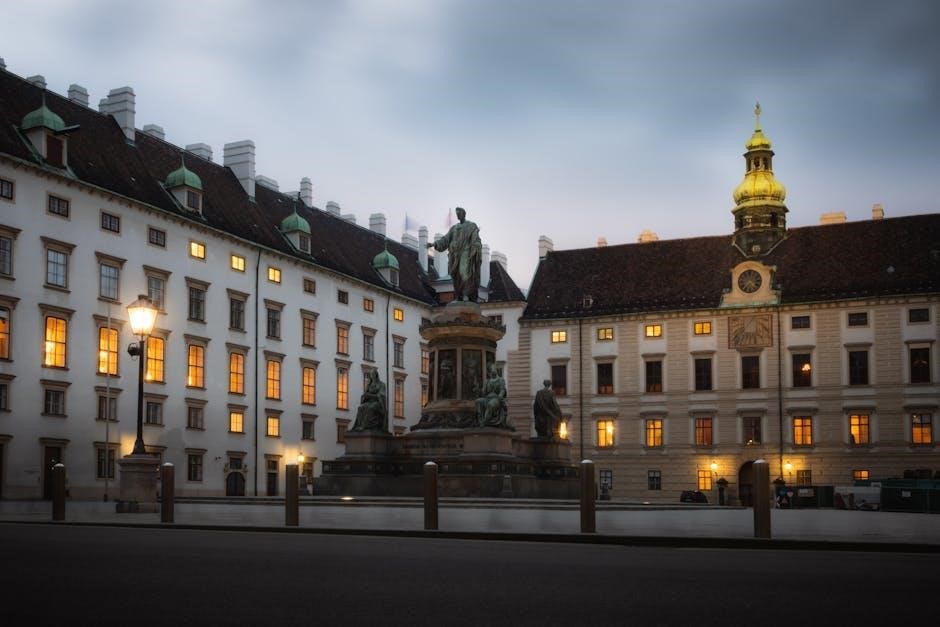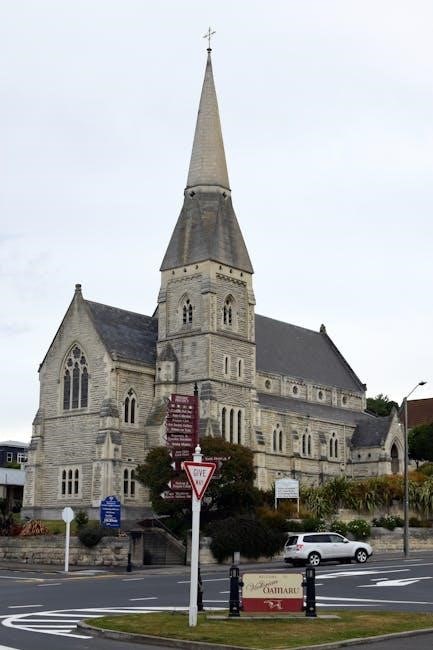Overview of “The Straight Detroit: America’s Premier Legacy City”
The Straight Detroit: America’s Premier Legacy City is a comprehensive guide edited by Jeffrey T. Horner, exploring Detroit’s economic, social, cultural, and political evolution. Available as a free PDF download, it offers insights into the city’s transformation and its significance as a legacy city.
Detroit, often hailed as America’s Premier Legacy City, embodies a rich history of innovation and resilience. Known as the Motor City, Detroit pioneered the automotive industry, shaping the nation’s industrial landscape. Its cultural impact extends to music, with Motown and techno originating there. The city’s legacy is marked by its ability to adapt and evolve, from its heyday as an industrial powerhouse to its modern efforts in revitalization. The Straight Detroit: America’s Premier Legacy City delves into this transformation, offering insights into Detroit’s past, present, and future. This comprehensive guide, available for free PDF download, highlights Detroit’s enduring significance as a city of innovation and cultural richness.
The Concept of a “Legacy City” and Its Significance
A Legacy City is defined as a metropolis with a storied past, shaped by its historical contributions to industry, culture, and society. These cities, like Detroit, have experienced significant economic shifts, yet their influence endures. The term underscores their role in shaping America’s identity. The Straight Detroit explores this concept, emphasizing how legacy cities adapt to modern challenges while preserving their heritage. The book, available for free PDF download, highlights the importance of such cities in driving future innovation and maintaining cultural relevance. Understanding legacy cities is crucial for urban development and learning from their resilience.
Economic Transformation and Revitalization
Detroit’s economic transformation reflects its shift from industrial dominance to diverse opportunities in technology, entrepreneurship, and innovation. The city’s resilience and strategic revitalization efforts highlight its potential for sustainable growth and renewal.
Detroit’s Industrial Heritage and Its Impact
Detroit’s industrial heritage is deeply rooted in its history as a manufacturing powerhouse, particularly in the automotive industry. The city’s rise in the 20th century was fueled by its role as the “Motor City,” home to iconic brands like Ford, General Motors, and Chrysler. This legacy shaped its economy, workforce, and cultural identity. However, the decline of traditional manufacturing led to significant economic challenges. Today, Detroit is navigating a transition to new industries while preserving its industrial roots. The city’s history serves as a blueprint for understanding its resilience and adaptability in the face of economic change, making it a prime example of a legacy city’s evolution and transformation.
Modern Economic Opportunities and Challenges
Detroit faces a mix of economic opportunities and challenges as it rebuilds its post-industrial economy. The city is leveraging its industrial legacy to attract new industries like technology, clean energy, and advanced manufacturing. Neighborhood revitalization efforts and the growth of small businesses are fostering local economic activity. However, challenges such as income inequality and limited access to capital persist. Detroit’s economic transformation requires strategic investments in education and workforce development to ensure residents can participate in emerging sectors. The city’s focus on sustainability and community engagement aims to create a more inclusive and resilient economic future. Balancing growth with equity remains central to Detroit’s modern economic strategy.

Cultural Significance and Social Considerations
Detroit’s cultural landscape is renowned for its musical innovations, such as techno, and its vibrant arts scene, significantly influencing American culture and fostering a diverse social fabric.
Detroit’s Role in Music and Artistic Innovation
Detroit is a cultural powerhouse, renowned for its pivotal role in shaping American music and art. The city is the birthplace of Motown, a legendary record label that launched icons like Stevie Wonder, Diana Ross, and Marvin Gaye, revolutionizing the music industry. Additionally, Detroit is the origin of techno, a groundbreaking electronic music genre that emerged in the 1980s and gained global popularity. The city’s vibrant arts scene, including murals, galleries, and festivals, reflects its diverse heritage. The Straight Detroit: America’s Premier Legacy City delves into these cultural milestones, showcasing how Detroit’s creativity continues to inspire and influence contemporary art and music worldwide, making it a hub for artistic innovation and expression. The free PDF download offers deeper insights into this rich cultural legacy.
Social Dynamics and Community Engagement
Detroit’s social dynamics are shaped by its diverse neighborhoods and community-driven initiatives. The city has a rich history of grassroots movements that foster unity and resilience. Programs like urban farming projects and neighborhood revitalization efforts highlight Detroit’s commitment to inclusivity and sustainability. The Straight Detroit: America’s Premier Legacy City explores how residents actively engage in shaping their communities through cultural events, educational programs, and collaborative partnerships. These efforts not only strengthen social bonds but also contribute to the city’s ongoing transformation. The free PDF download provides a detailed look into Detroit’s vibrant community engagement strategies and their impact on fostering a cohesive and dynamic urban environment, making it a model for other cities.

Political and Historical Context
Detroit’s political and historical journey is marked by its rise as an industrial powerhouse and challenges like racial tensions and economic decline, shaping its resilient identity.
Historical Events Shaping Detroit’s Identity
Detroit’s identity is deeply rooted in its rich history, from its founding in 1701 by Antoine de la Mothe Cadillac to its rise as a industrial powerhouse. The city played a pivotal role in the Underground Railroad, aiding escaped slaves. The 20th century saw Detroit become the “Arsenal of Democracy” during WWII and the birthplace of the automotive industry, led by Henry Ford. The 1967 riots marked a turning point, highlighting racial tensions. The city’s resilience was tested again during its 2013 bankruptcy but emerged with renewed focus on revitalization. These events have shaped Detroit’s identity as a city of innovation, struggle, and transformation, reflecting its legacy as a premier American city.
Political Leadership and Urban Development
Detroit’s political leadership has been instrumental in shaping its urban development trajectory. From the visionary mayors like Coleman Young, who championed racial equality and economic growth, to contemporary leaders focused on post-bankruptcy revitalization, political strategies have significantly influenced the city’s landscape. The Straight Detroit highlights how collaborative efforts between local government and private sectors have driven initiatives like downtown revitalization and neighborhood renewal. These efforts aim to create a sustainable and inclusive urban environment, addressing historical disparities while fostering future growth. The interplay of politics and urban planning continues to define Detroit’s path as a legacy city, balancing progress with community needs.
Urban Revitalization Efforts
Detroit’s urban revitalization efforts focus on transforming its landscape through sustainable initiatives and community-driven projects. The Straight Detroit details how public-private partnerships are revitalizing neighborhoods, fostering economic growth, and creating a vibrant, inclusive cityscape.

Initiatives for City Renewal and Sustainability
Detroit’s urban renewal initiatives emphasize sustainability and community engagement. Programs like urban farming and green infrastructure aim to revitalize neglected areas while promoting environmental health. The city’s riverfront restoration and public transportation upgrades are key projects fostering connectivity and accessibility. Public-private partnerships, such as collaborations with tech companies like Microsoft and Google, are driving innovation in infrastructure and energy efficiency. These efforts not only address economic challenges but also strive to create a more inclusive and sustainable future for Detroit’s residents.
Community-Inclusive Development Strategies
Detroit’s development strategies prioritize community inclusion, ensuring diverse voices are heard in planning processes. Neighborhood revitalization programs focus on affordable housing and local business support, fostering economic equity. Community land trusts and participatory budgeting empower residents to shape their environments. Cultural initiatives celebrate Detroit’s heritage, enhancing community pride and social cohesion. These inclusive approaches aim to create a city where all residents can thrive, reflecting Detroit’s commitment to equitable and sustainable growth.

Accessing “The Straight Detroit: America’s Premier Legacy City” in PDF
The Straight Detroit: America’s Premier Legacy City is available for free download as a PDF. Access it through platforms like Google Books or the official publisher’s website.
Free Download Options and Availability
Readers can access The Straight Detroit: America’s Premier Legacy City for free in PDF format through various platforms. It is available on Google Books, the publisher’s website, and academic databases. Additionally, initiatives like Knowledge Unlatched and NEH Humanities Open Book grants support its open access. This ensures the book is widely accessible, making its insights on Detroit’s legacy and revitalization reachable to a global audience. Simply visit the specified platforms, search for the title, and download the PDF version to explore the comprehensive analysis of Detroit’s cultural, economic, and political landscape.
Importance of Digital Access to Academic Resources
Digital access to books like The Straight Detroit: America’s Premier Legacy City is crucial for fostering education and research. By making the PDF available for free, it ensures that students, scholars, and enthusiasts worldwide can explore Detroit’s legacy without financial barriers. This accessibility promotes equality in learning and encourages a broader understanding of urban revitalization. Open-access initiatives like this align with global efforts to democratize knowledge, benefiting both individual readers and academic communities. As a result, the insights into Detroit’s cultural and economic journey are shared widely, inspiring new perspectives and research opportunities.




About the author